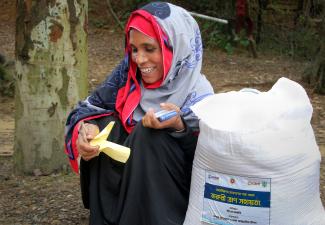Bangladesh is extremely susceptible to floods, cyclones, storm surges, earthquakes, and droughts. Coupled with fluctuating global markets, political instability, inadequate governance, population growth, and gender disparities, exposure to these conditions disproportionately affects poor communities, making them more vulnerable to poverty and malnutrition. USAID’s disaster readiness, humanitarian assistance and food security programs help nearly three million poor Bangladeshis strengthen their resilience by offering long-term solutions to raise incomes, improve health and nutrition, reduce vulnerability to disasters, and improve food security.
Improving Food Security in Vulnerable Communities
USAID partners with local government, traditional leaders, and civil society groups to educate people in rural and underserved communities about proper nutrition and food production, water, sanitation, hygiene, disease prevention and disaster risk reduction. We teach people new job skills to diversify their income sources, enabling them to earn more money while expanding access to credit and finance with a focus on reaching women and youth. USAID resilience programs also help improve maternal and child health and nutrition, and ensure greater access to public services among the most vulnerable communities in the country.
Preparing for Disasters
USAID helps local governments and communities better respond to natural disasters and climate-related calamities, targeting the most vulnerable areas of the country. Disaster management committees and volunteer groups receive training to better assess risks, develop effective contingency plans, and conduct simulation drills to prepare for disasters. USAID also partners closely with the government of Bangladesh to strengthen its capacity to utilize early warning systems and implement response activities more effectively to keep people out of harm’s way. USAID has partnered with the GOB, the U.S. Army Corps of Engineers, and other international organizations to build and refurbish multi-purpose disaster shelters that provide safe havens during severe weather. These shelters serve as schools and community centers during non-emergency conditions. USAID investments have also helped flood-prone communities build earthen embankments, or plinths, to raise their homesteads and livestock above the reach of floodwaters to avoid loss of property.
Saving Lives with Early Warning Systems
In addition, USAID has worked with the government and other partners to improve early warning systems that use technology to generate targeted weather and flood forecast advisory messages for people living in coastal areas and other locations prone to flooding or landslides – alerting them of severe weather well in advance. Strengthened flood forecasting and early warning systems provide people with up to 15 days of advance warning instead of only three, helping them prepare and stay out of harm’s way during severe weather events.
Providing Humanitarian Assistance
When disasters occur, USAID responds with emergency assistance including food, cash, safe drinking water, and other emergency sanitation and hygiene supplies. We also oversee longer-term rehabilitation and reconstruction programs to help communities affected by disasters recover more quickly and effectively. In Bangladesh, the United States is the leading contributor of humanitarian assistance in response to the Rohingya crisis. Since the refugee influx began in August 2017, the United States has collectively contributed nearly $2.4 billion in humanitarian assistance to those affected by the crisis in both Bangladesh and Burma, of which nearly $2 billion supports refugees and host communities in Bangladesh. USAID provides food assistance to all Rohingya refugees and aims to improve the nutrition of women and children living in refugee camps by providing specialized nutrition products and services.
Learn more about USAID's humanitarian assistance work in Bangladesh.
Results
- Since 2001, USAID has rehabilitated and constructed over 900 disaster shelters through our activities that provide safe havens for 700,000 people during emergencies.
- In 2023, USAID also provided disaster management training to over 300 personnel at the community level, alongside training to 2,800 headteachers in disaster-prone areas to improve their knowledge of disaster mitigation and continuing education services following natural disasters.
- In 2023, USAID promoted climate-smart agricultural practices, improved seed varieties, new technologies in disaster-prone areas, and trained over 4,000 local service providers to mitigate the risks of climate-induced disasters and enhance farmers’ resilience.
- In response to record flooding in northeastern Bangladesh in June 2022, USAID provided emergency assistance to help 6,000 families in the hardest-hit areas of the Sylhet and Sunamganj districts. USAID cash-for-work activities also supported repair and maintenance of earthen mounds that keep households safely above flood levels.
- In response to record flooding in the Bandarban district in May and August 2023, USAID provided emergency funding to Bangladesh Red Crescent Society to immediately assist 20,000 people with urgent needs.

Asafuzzaman Captain/CARE
